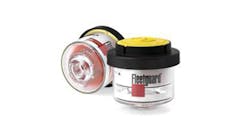Fleets looking to achieve the greatest return on investment from their purchases of diesel exhaust fluid (DEF) should strongly consider large suppliers that service the entire nation, as the risks and potential consequences of buying from smaller or less prominent suppliers far outweigh any financial savings to be gained.
Large, name-brand suppliers offer API (American Petroleum Institute)-certified DEF. The certification ensures it meets the ISO 22241-1 standard, which specifies the quality characteristics of the NOx reduction agent AUS 32 (aqueous urea solution) needed to operate converters with selective catalytic reduction.
“You have smaller, local oil-jobber-type suppliers out there that don’t have certification,” says Thomas Kalagher, manager of new product development for Prestone, a provider of antifreeze/coolant. “Maybe they make it themselves, but whatever the case, they may be able to sell you DEF for a few pennies less per gallon than a nationwide brand.”
There are a number of reasons why these suppliers may be able to offer DEF at a reduced cost, he says:
- They don’t have the same quality procedures in place when making DEF.
- They don’t offer API-certified DEF and/or their DEF doesn’t meet the ISO 22241-1.
- They aren’t servicing the entire country.
LONG-TERM CONSEQUENCES
While fleets may be tempted by the opportunity to cut upfront costs, the long-term ramifications of purchasing low-quality DEF cannot and should not be overlooked. Contaminated or diluted DEF can wreak havoc on vehicle performance and significantly increase downtime.
“If DEF is put into the system, but something else is in it and the quality of the DEF is diluted, the (vehicle’s) catalytic converter is (adversely) affected,” says Ron Schornstein, owner of Acustrip, a provider of coolant test strips. When that happens, it shuts the vehicle down and the repairs could run into thousands of dollars.
Adds Kalagher: “You may find out you’ll pay a whole lot more for repair costs for the catalytic converter and other emissions components if the DEF supplier isn’t meeting ISO standards. Using a well-known national brand can save you money.”




